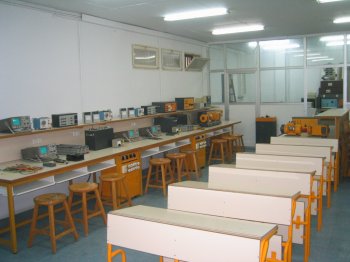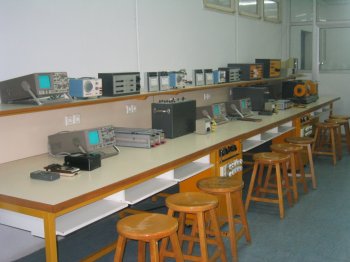Director: Dr. Antonios X. Moronis, Professor
The laboratory of Electrotechnology and Measuring Systems belongs to the Sector of Energy Electrical Engineering of the Department of Energy Technology Engineering.

AIMS
The laboratory is primarily aiming
to provide laboratory training to students in order for them† to deeply understand and consolidate the theoretical
part of ongoing courses and to familiarize them with the requirements of practical applications. Furthermore,
the laboratory serves to conduct undergraduate and postgraduate research work, research
projects or other independent research work.
ACTIVITIES
EDUCATION
The following laboratory
courses of the undergraduate program in Energy Technology Engineering are
taught †:
- Electrical Network
Analysis (2nd Semester)
- Measurement Systems (4th Semester)
- Electrical Installations (7th Semester)
Course description:
- Electrical
Network Analysis
The student becomes familiar with the measuring devices and the use of
instruments used for measuring and monitoring electrical quantities in AC
or DC Networks. These quantities include voltage, current, frequency, impedance,
real, reactive and apparent power, power factor et.c., emphasizing in the
energy aspects of electrical circuits and networks. The course objective
is to help the students understand the theoretical part of the course of
electrical networks analysis and acquire the necessary background for all
forthcoming classes in electrical energy engineering topics.
- Measuring
Systems
This course is referring to the study of†
principles, methods and circuits used for measurements of basic
electrical and other physical quantities. Reference is made to the analog
and digital measuring systems as well as to various transducers and
sensors which are commonly used in energy systems or installations. Also
the basic †factors affecting the
accuracy of a measurements are introduced and typical terms such as precision,
random or systematic error and resolution are examined.
- Electrical
Installations
This† laboratory course familiarizes
students with basic principles in design, operation and safety of
Electrical Installations in Energy Systems. The students acquire the
necessary background for the design and the selection of equipment in †typical Electrical Installations,
emphasizing in† protection and
safety. Standard testing methods are introduced and practiced, †in accordance with the national and
international standards (ELOT HD384, IEC etc.). In addition, typical
control systems in Electrical Installations are introduced, engaging
programmable logic controllers (PLCs).
DISSERTATIONS - THESES
Undergraduate students are
working in the laboratory in order to prepare their dissertations. Various
dissertations have already been carried out, within the scientific areas
covered† by the laboratory, including
energy electrical systems, electrical installations, electrical circuits and
networks and measuring systems.
In addition, a number of MSc
theses has been carried out in the laboratory, under the postgraduate program †“MSc in Energy” which is held in cooperation
of TEI Athens with the Heriot-Watt University of Edinbourgh, Scotland.
At present, the laboratory
also supports PhD students.
RESEARCH
The laboratory is supporting the
research activities of the laboratory staff†
and participates† in funded
research projects, such as:
•†Research project in the framework EPEAEK ARCHIMEDES II, entitled "Developement
of modern measurement and simulation techniques in electrical grounding systems,
implementing new technologies"
This project has been
organized in cooperation of the Department of Energy Technology
Engineering† of TEI Authens with the
Laboratory of High Voltage Engineering of the School of Electrical and Computer
Engineering of the National Technical University of Athens and† has been co-funded by the EU and the Greek
Goverment. The behavior of electrical grounding systems
over time has been investigated and a new methodology has been developed for the
calculation of the soil multilayer structure parameters, based on a genetic
algorithm. The change in resistivity of the ground has been also studied and the
dependency on the ambient temperature and the frequency of rainfall intensity
(which is indicative of the soil moisture) has been shown. The analysis of
experimental results for ground resistivity and ground resistance, based on a
large number of measurements, has shown that the soil in which measurements have
been performed may be optimally simulated as a two-layer ground. The calculation
of critical soil parameters (resistivities p1, p2 and depth of the surface
layer h1), has been carried out with high accuracy by the implementation of prototype
software based on a genetic algorithm, developed within the aims of the project.
•†Research project in the framework EPEAEK ARCHIMEDES, entitled "Implementation
of Artificial Intelligence Techniques in Power System
This project has been
organized in cooperation of the Department of Energy Technology
Engineering† of TEI Authens with the
Laboratory of High Voltage Engineering of the School of Electrical and Computer
Engineering of the National Technical University of Athens and† has been co-funded by the EU and the Greek
Goverment. The aim of the research project was the development of modern
methods and tools for systematic monitoring, fault diagnosis and optimization
of Power Systems Equipment with emphasis on Electrical Machines and Power
Transformers. Within the scope of the project, two prototype expert system
applications have been developed for fault diagnosis and maintenance of
electrical machinery and power transformers.
•†EPEAEK II Project entitled "Reformation of Undergraduate Studies Programs"
regarding the implementation of a modern energy auditing system comprising an
on-line communications platform and a data acquisition system connected with powermeters,
for monitoring, recording and analysis of electrical energy consumption data
and power quality data† in real
industrial or commercial installations for research or educational purposes.
LABORATORY EQUIPMENT
The available equipment
comprises :
- Analog and digital
ampmeters or votmeters
- Hand-held or bench
multimeters
- Analog and digital Wattmeters
(single-phase or three-phase)
- Digital Powermeters
- Communication platform
for powermeters
- Electrical Motors
- Generators
- AC-DC power sypplies
- Oscilloscopes, waveform
generators
- Power Inductors,
Resistors and Capacitors
- Transformers (single
phase-three phase)
- Adjustable resistors, phase shifters
- Wheatstone
Bridges
- Temperature, humidity and
air speed sensors
- Adjustable 40kV dc high
voltage generator
- Electrical Insulation
Testers
- Thermographic Camera
- Electrical Installations
Simulation and Measuring Board, for the conduction of typical tests under
the ELOT HD384 National Standard
- Programmable Logic
Controllers (PLC)
- Ground resistivity and
ground resistance measuring system.

STAFF
ACADEMIC STAFF
Dr. Antonios Moronis, Professor,
Lab Director
Dr. John Rampias, Professor
Technical Staff
Lambros Skoufoulas
Part-time Staff
1.††††† George Tsekouras, Electrical Engineer, PhD
2.††††† Demetrios Tsalemis, Electrical Engineer, PhD
3.††††† Stylianos Papadopoulos, Electrical Engineer, MSc
4.††††† Stylianos Kampanaros, Electrical Engineer
CONTACT
ADDRESS:
LABORATORY OF ELECTROTECHNOLOGY
AND MEASURING SYSTEMS
Department of Energy Technology Engineering
Faculty of Technological Applications
‘echnological Educational Institute (TEI) of Athens
Ag. Spyridonos, 12210 Egaleo
PHONE
: +30 210 5385344
FAX : +30 210 5385306
E-MAIL:amoronis@teiath.gr
|